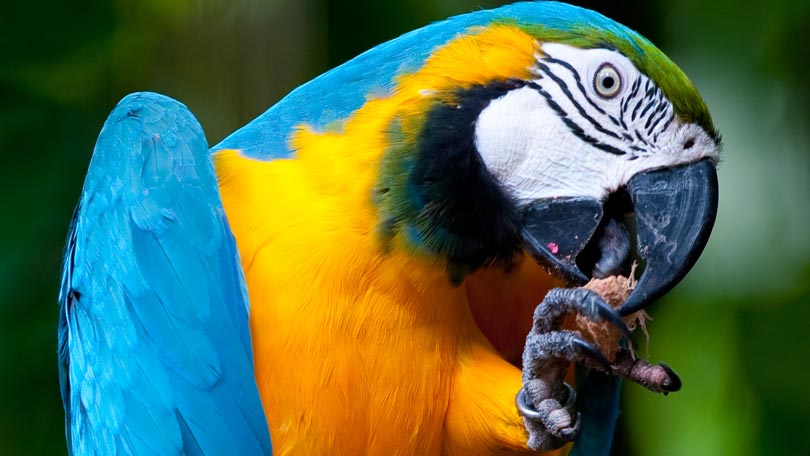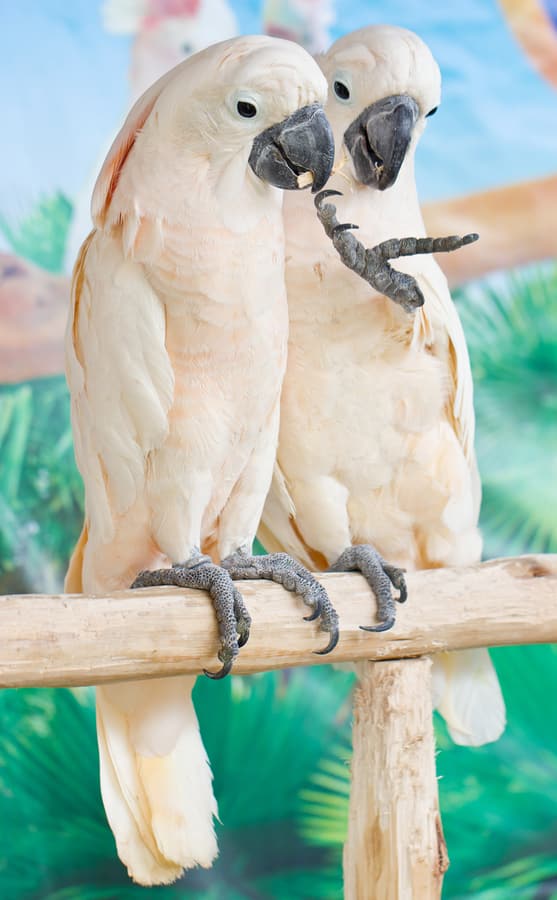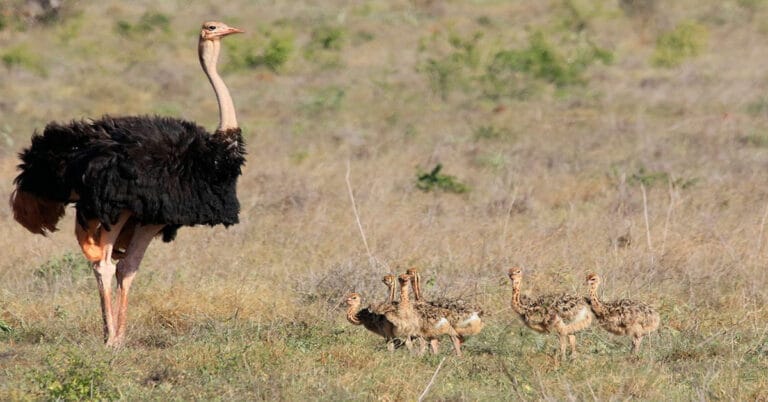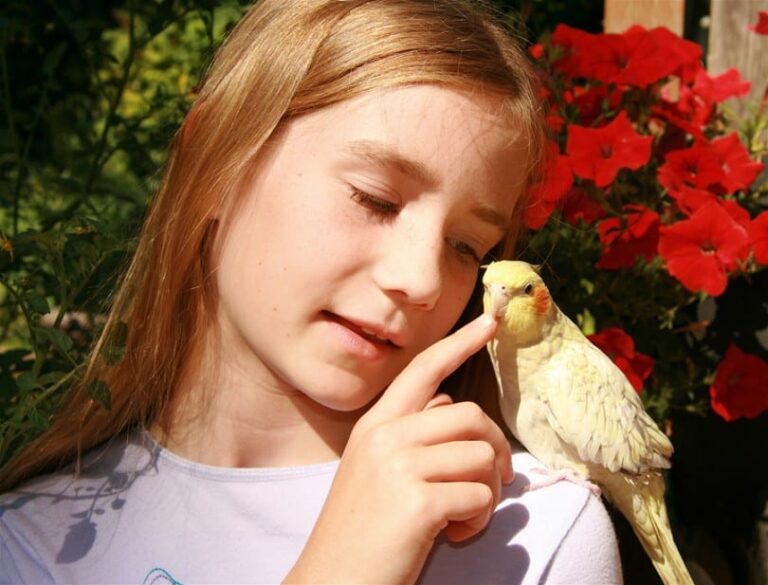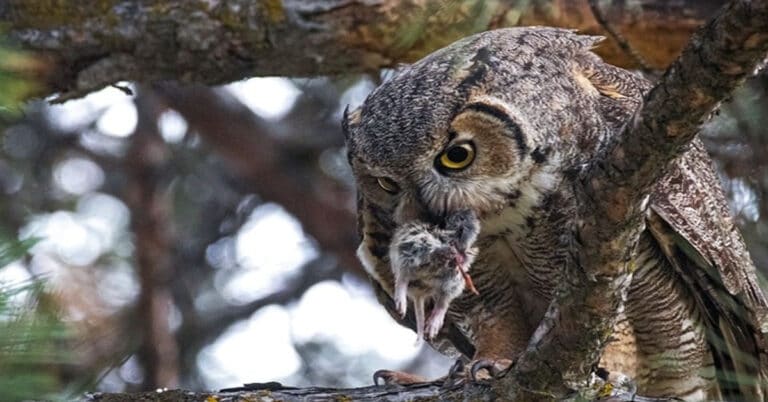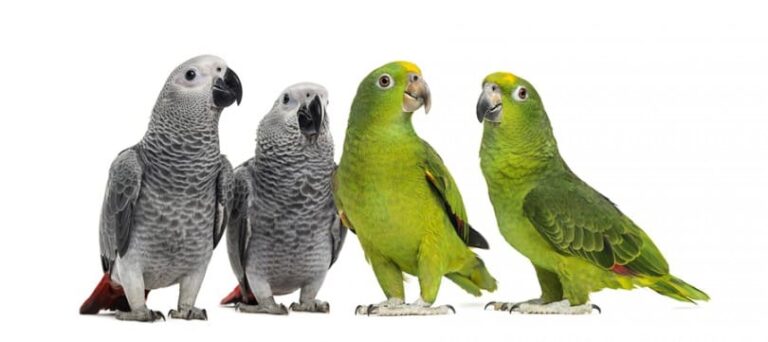Common Health Problems in Parrots
Providing quality care goes a long way to prevent most of the common health problems in parrots. Feed your bird a healthy diet of pellets, seeds, grains, nuts, and fresh fruits and vegetables. Make sure that clean water is available at all times. Provide full spectrum lighting and a vitamin and mineral supplement as needed. Keep your bird’s cage, perches, and toys cleaned and disinfected. If you have other birds, quarantine any new bird when it arrives. Take your parrot to visit an avian veterinarian for an annual checkup. Educate yourself on health problems common to parrots and report unusual changes in your bird to your veterinarian. As is the case with humans, prevention is often the key to good health.
Many accidents and injuries can also be prevented. Find out which plants in your home are toxic and give them to a friend who owns no animals or small children. Do not feed your bird avocados, chocolate, or any other toxic food. Avoid burning scented candles, using aerosol sprays, smoking cigarettes, or cooking with Teflon-coated pans, as any of these are hazardous to your bird. Inspect all toys and remove broken ones. Give serious thought to clipping your bird’s wings. (Some owners do not like to render their bird unable to fly, but all too often an unclipped bird flies out an open door or window, never to be seen again.) Always supervise your bird when it is outside of the cage, and be mindful to watch interactions between your bird and other pets. Do not let your bird get into the habit of walking about on the floor, as small birds can be stepped on and any bird might chew electrical cords.
An emergency is not the time to find out that the veterinarian who treats your dog does not treat parrots. Make sure to locate an avian veterinarian before bringing a bird home. If an emergency or illness arises, you’ll know your bird is in good hands.
Signs that your Parrot may be Injured or Sick
Despite the best efforts, birds sometimes become ill or injured. How do you know if your parrot is in need of medical care? Birds, like all prey animals, are good at concealing illness. It is up to the bird owner to know what to look for.
Signs that something is seriously wrong with your parrot include weight loss; vomiting; labored or abnormal breathing; a fluffed or huddled position; a loss of appetite or refusal to drink water; discharge from eyes, mouth, or nostrils; bleeding; signs of injury or swelling; or significant changes in your bird’s disposition or behavior. If any of these signs are present, seek immediate medical care for your pet. Other signs to watch for include favoring a limb; overgrowth of beak or nails; changes in eating or demeanor; sore or flaky skin; stained feathers around the eyes or vent, or dull and broken feathers. These are all signs of potential illness and require consultation with your avian veterinarian.
Your bird’s droppings are a key indication of its health. The stool will normally be green if your bird primarily eats seeds and brown if its diet consists mostly of pellets. Some fruits and vegetables will change the color. For instance, your bird’s dropping may have a purple hue on a day it has been fed blueberries. The shape of your bird’s stool should be coiled or semi-coiled. The liquid urates surrounding the stool are normally white and chalky when dry.
Changes in your bird’s droppings can mean trouble. While an occasional loose stool is normal, diarrhea can indicate a serious condition. Color changes to either black or bright green, or stools covered with slime, are an indication that something is seriously wrong. If changes occur in the normally white urates, this is also a time to contact the veterinarian. Notify your vet if the droppings contain undigested seeds or food.
Health Problems and Illnesses Common to Parrots
Polyoma Virus is of most concern to bird breeders, as it reduces fertility and is more deadly in chicks than adult birds. In adult birds, the virus manifests in liver disease, which can result in death, but most often causes only moderate illness. A vaccine is available for Polyoma Virus.
Psittacine Wasting Disease is believed to be viral and is seen most often in Macaws. The illness begins with vomiting and other gastrointestinal symptoms, and proceeds to overall weakness and rapid weight loss. Diagnosis is made through a biopsy of the stomach. This disease usually results in death.
Psittacosis or Parrot Fever is an infectious disease that is also contagious to humans. Affected birds show a variety of symptoms, including respiratory difficulties, weepy or runny eyes, sneezing, and congestion. Respiratory infections can prevent breathing. Psittacosis can also lead to liver disease and death. Psittacosis has the ability to incubate without symptoms for years, making it possible for an infected bird to appear healthy. Fecal tests are used to diagnose this disease, but birds shed the organism at intervals, so a test may fail to detect the disease. Both affected and unaffected birds can spread the disease-causing organism. When diagnosed, affected birds, and birds housed near them, are quarantined and treated with antibiotics. Humans infected with this disease usually show flu-like symptoms, but this illness can be much more serious in people with compromised immune systems. Because Psittacosis can be transmitted to humans, all cases of infections in birds must be reported to health officials.
Aspergillosis is a respiratory disease of birds caused by a fungus. This fungus is present in the environment and is usually not a problem for a healthy bird kept in a clean environment. Affected birds show loss of appetite, frequent drinking and urination, and severe respiratory difficulties. Surgery may be necessary to remove the lesions. Antifungal drugs are usually prescribed in conjunction with supportive care such as oxygen and tube feeding. Diagnosis is made through blood tests, X-rays, and endoscopy. Aspergillosis is often fatal.
Psittacine Beak and Feather Disease is a highly contagious viral infection originally found in Cockatoos, but is contagious to all parrots. This condition results in abnormal feather development and beak growth. Over time affected birds lose their fathers. As the disease advances, the beaks of affected birds grow abnormally and form different layers, often resulting in pain that may render the bird unable to eat. There is no treatment or vaccine available for this disease.
Pacheco’s Disease is a highly contagious disease among parrots caused by a herpes virus. This virus attacks the liver and is fatal. Other than support care, no treatment is available for affected birds, but exposed birds can be given antiviral medication to help prevent the spread. There is no vaccination for Pacheco’s Disease.
Feather plucking, while not a disease, is a serious health problem common in parrots. The reasons a parrot plucks or chews its feathers are so complex, and the remedies so numerous, it is impossible to cover them and still address other health issues in this article. Nutrition, allergies, humidity issues, trauma, and a whole host of behavioral and social issues factor into feather plucking. Consult your avian veterinarian to talk about this problem if you notice your bird chewing or removing its feathers.
With proper care, it is possible to prevent many of the common health problems in parrots. A responsible owner needs to do a lot of reading and ask a lot of questions to ensure that he or she is providing their bird with what it needs to be healthy and happy.

Having discovered a fondness for insects while pursuing her degree in Biology, Randi Jones was quite bugged to know that people usually dismissed these little creatures as “creepy-crawlies”.

